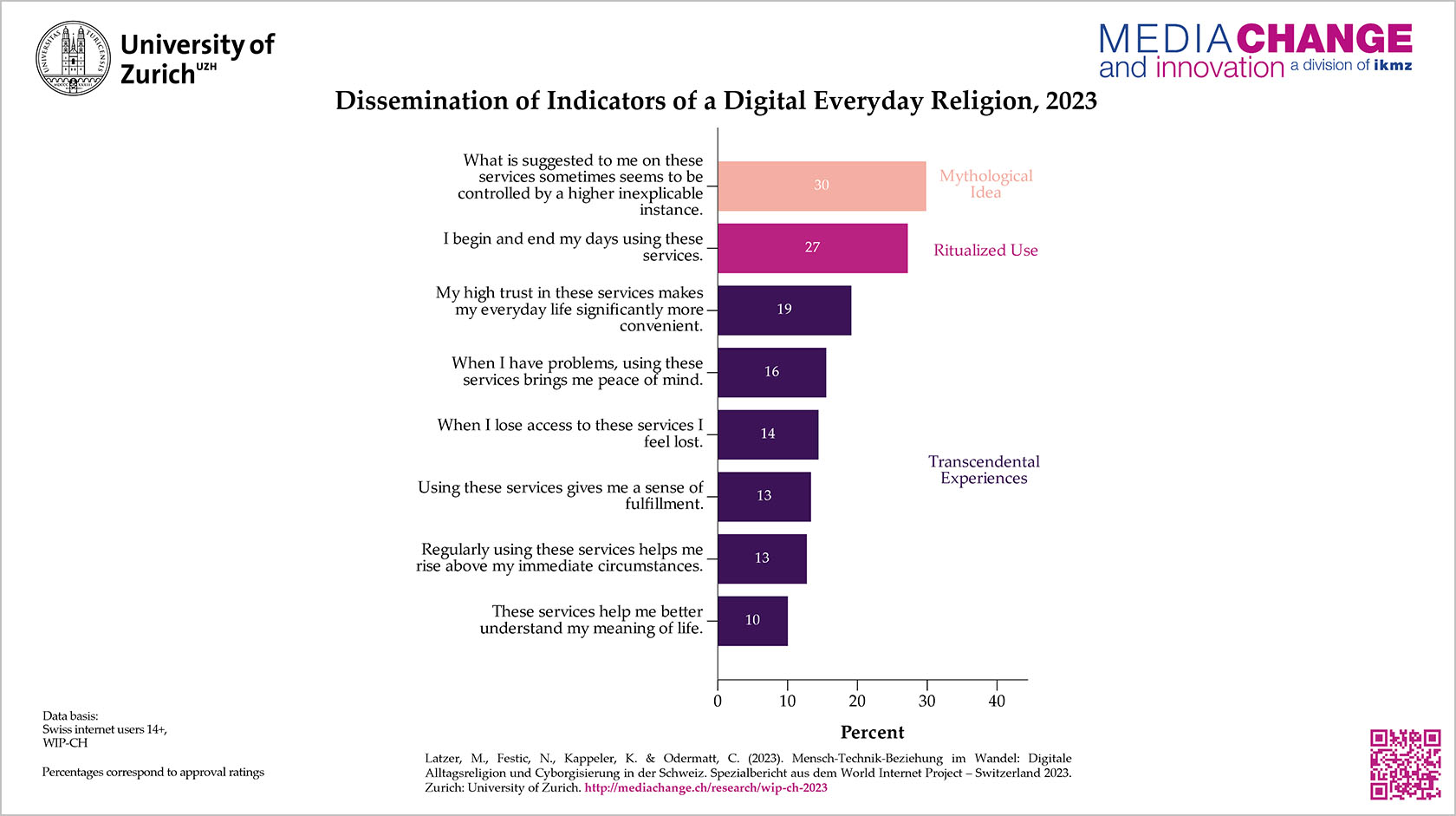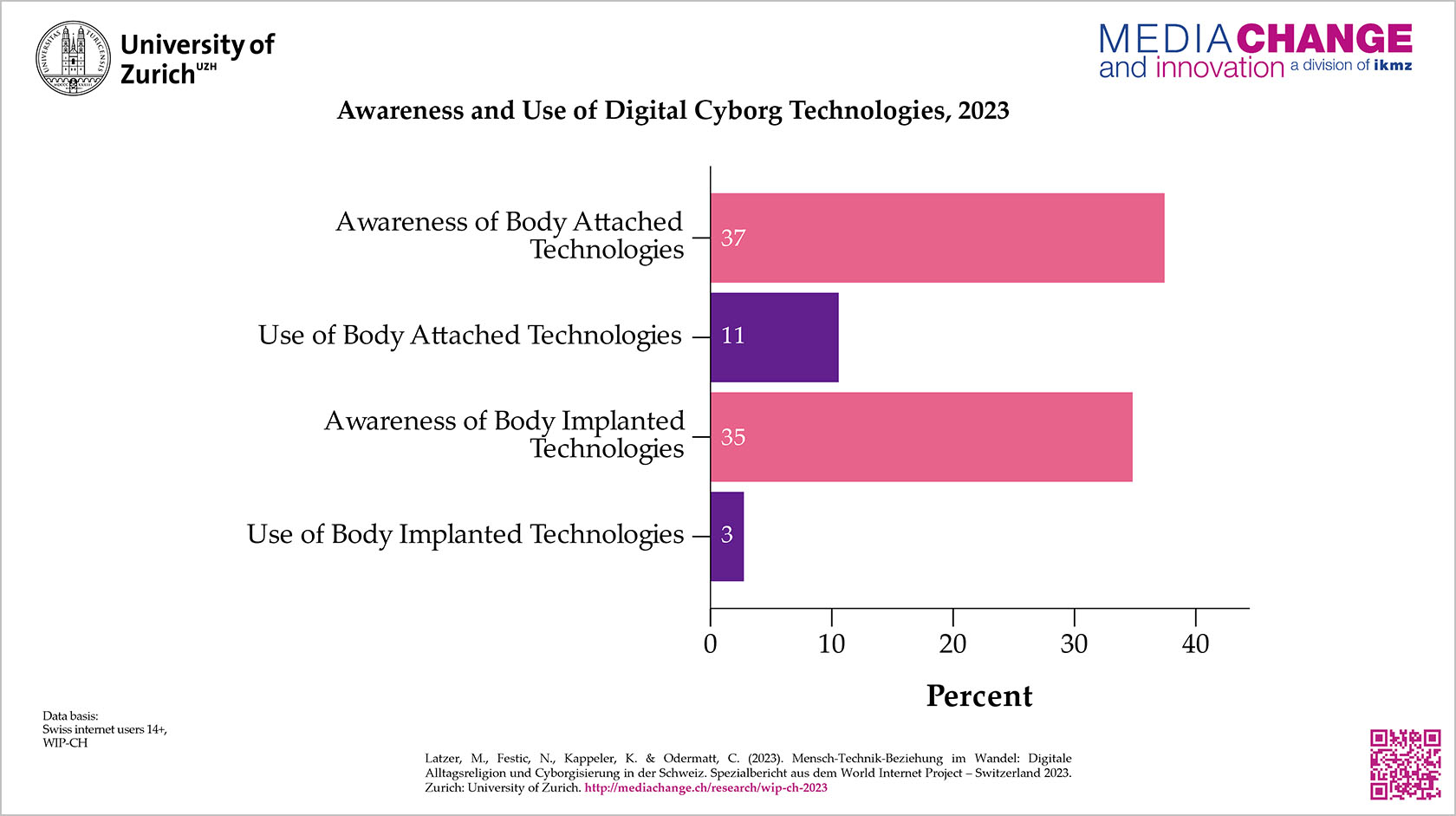Navigation auf uzh.ch
Navigation auf uzh.ch

Chatbots with artificial intelligence (AI) such as ChatGPT or Bard are already widespread in Switzerland: eight out of 10 internet users (79%) have already heard of them and half of those (37%) have already either tried (18%) or used them multiple times (19%). Younger and more highly educated people know of and use these services particularly often. “The high level of awareness and use of ChatGPT and similar AI applications is surprising, especially since they have only been available since the end of 2022,” emphasizes Michael Latzer, professor of Media Change and Innovation at the University of Zurich.

Digitalization is giving rise to a new social form of religion – an everyday digital religion. The everyday use of digital services fulfills similar social functions as traditional religions, e.g., reducing complexity, creating meaning or social cohesion. “The religion-like nature of internet use is reflected in mythological ideas about how digital services work, in their ritualized use and in transcendental experiences with digital services,” explains Michael Latzer. Just under a third of the population (30%) think that suggested content in social networks or health and well-being apps is controlled by an inexplicable, higher instance.
For a quarter of the population (27%), internet use has become a kind of ritual: they start and end their day with it. Between 10% and 19% of internet users report transcendental experiences that exceed the usual boundaries of everyday life. These indications of a digital everyday religion are more pronounced among younger people: 4 in 10 of 14 to 19-year-olds (38%) say that their regular use of these services helps them rise above their immediate circumstances. A good third of this youngest group agree that using their preferred digital services gives them peace of mind when they have problems (36%).

The merging of humans and technology known as cyborgization reinforces the religious nature of digitalization. Cyborg technologies are used to achieve transhumanist goals, i.e., overcoming human limitations and thus also reaching divine characteristics such as omniscience and eternal life. The study examines non-medically required cyborg technologies for self-optimization such as stick-on patches for electronic brain stimulation or chips implanted in the hand for making payments. They are used to improve physical and mental abilities, exceed biological limits and thereby increase longevity and well-being. A good third of the Swiss online population is familiar with cyborg technologies attached to the body (37%) or implanted in the body (35%). Their distribution is currently low and lies in the low single-digit percentage range. However, 4 out of 10 internet users believe that they could make their everyday life much more convenient by using them (39%). At the same time, there is a high level of risk awareness, particularly with regard to cybercrime (78%) and privacy breaches (70%). 3 out of 10 people would like the state to place greater restrictions on such new technologies (31%). One in ten people (9%) state that they would like to use cyborg technologies attached to their body as soon as they are available and affordable. Six percent can imagine having a chip implanted.
Overall, younger people and men are more optimistic about such technologies. The transhumanist belief in a technically controllable evolution of human abilities is also more pronounced among younger people. They are more likely to believe that new digital technologies can solve almost all of society's problems (14 to 19-year-olds: 21%, 70+: 4%). Overall, fewer people feel that they belong to the information society in 2023 (47%) than in previous years. “The emergence of artificial intelligence or cyborg technologies seems to be accompanied by a certain degree of uncertainty,” says Michael Latzer.
The study, conducted by Michael Latzer and his team for the seventh time since 2011, shows that 4 out of 5 Swiss internet users inhibit their online communication behavior due to a feeling of being monitored: this applies to the disclosure of personal information (83%), the search for information (81%) and the expression of feelings or opinions (79%). Compared to 2019 and 2021, this share is around 20 percentage points higher. Under-20s are the most likely to experience such chilling effects. Fear of privacy violations by governments is also on the rise (37% in 2023 vs. 27% in 2021). Furthermore, only a small and decreasing proportion believe they can control their privacy online (28% in 2023 vs. 41% in 2021). Nevertheless, the majority in Switzerland (61%) think that the internet is a good thing for society.
Since the Covid pandemic, the amount of time the Swiss spend online has once again increased significantly: Today, the average is 5.6 hours per day (2021: 4.5 hours). An increasing proportion (36%) think that this is already significantly more internet consumption than they desire (2017: 24%). The digitalized everyday life of the population has changed significantly in the last decade: in 2023, one in two people (53%) use health tracking apps for self-measurement, while voice assistants such as Siri or Alexa are part of everyday life for one in three people (33%). WhatsApp has become a universally used communication infrastructure (94%) and a clear majority consume music (67%), videos (74%) or podcasts (65%) online. Social media is also professionally attractive for young people in particular: 3 out of 10 14 to 19-year-olds would like to become influencers.
The digitalization pushes triggered by the Covid pandemic are developing differently. They are proving most sustainable for remote work: during the pandemic, employees whose work can generally be carried out from home worked from home three times as often as before (61% vs. 19% of work). In 2023, the proportion of working from home is at one and a half days (32%). Cashless payments have decreased slightly compared to the pandemic period, but the level is higher than before the pandemic. On average, a third of all products are purchased online, both now and during the pandemic. Before the pandemic, this proportion was 26%. Private meetings rarely take place online, which was also the case before the pandemic. In the 2021 survey, the Swiss online population also did not want to see a shift to the digital space for private meetings. “There are clear differences between the short-term digitalization push forced by Covid, what is desired in the long term and what actually occurred,” emphasizes Michael Latzer. “We are seeing sustained pandemic-induced digitalization pushes, especially in professional life, but also in the purchase and payment of products.”